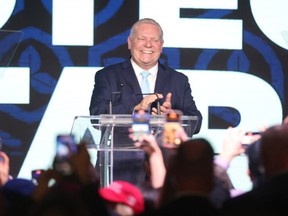VICTORIA — Premier Doug Ford’s win in Ontario this week established another precedent for ignoring fixed election dates, the reform that got its start here in B.C. two decades ago. Read More

Article content
VICTORIA — Premier Doug Ford’s win in Ontario this week established another precedent for ignoring fixed election dates, the reform that got its start here in B.C. two decades ago.
Article content
Article content
Article content
Ontario, like B.C., has a law that mandates an election every four years. In Ontario, the next scheduled date was June 2026.
Article content
Article content
Ford took advantage of the escape clause. Nothing precludes a premier from asking the lieutenant-governor to dissolve the house for an early election, advice that the viceregal representative is almost certain to take.
Article content
Advertisement 1
Story continues below
Article content
Article content
The Ontario premier took advantage of the opening provided by U.S. President Donald Trump and his threat to whack this country with 25 per cent tariffs.
Article content
Article content
Article content
“I want to make sure I have a strong mandate to outlast President Trump,” said Ford in pleading with the electorate to grant his government “the largest mandate in Ontario’s history.”
Article content
Article content
The voters didn’t go that far. The preliminary results gave Ford pretty much the same seat count as he’d held going into the election.
Article content
Article content
But neither were the voters inclined to punish the premier for what the Opposition parties branded an unnecessary and cynical election call.
Article content
Article content
Ford came away with a better-than-50 seat lead over the second-place NDP and a secure hold on a third term, something no Ontario government has managed to do since the 1950s.
Article content
Article content
The outcome somewhat recalls what happened in B.C. when then Premier John Horgan called a snap election in 2020.
Article content
Article content
B.C. was the first province in the country to go with a fixed election date. B.C. Liberal Premier Gordon Campbell enacted the measure after taking power in 2001.
Article content
Advertisement 2
Story continues below
Article content
Article content
He argued that it would bring certainty to the electoral cycle, and remove the arbitrary power of premiers to call elections when the opinion polls favour their re-election and catch the Opposition off guard.
Article content
Article content
Stories You May Like
-

Ontario Premier Doug Ford gives his acceptance speech at the Toronto Congress Centre on Thursday evening.
-

https://vancouversun.com/opinion/bc-ndp-excuses-on-er-closures-wearing-thin
-
Advertisement embed-more-topic
Story continues below
Article content
The measure was copied in most provinces across the country. Campbell stuck to the four-year cycle with elections in 2005 and 2009.
Article content
Article content
His successor, Christy Clark, toyed briefly with the idea of seeking a fresh mandate in a snap election. In the end, she stuck to the schedule set down in law for elections in 2013 and 2017.
Article content
Article content
Clark lost her legislative majority in the latter election. The New Democrats took over with John Horgan as premier in a power-sharing agreement with the Greens.
Article content
Article content
Horgan initially respected the idea of a fixed election date, even enshrining it into the agreement with the Greens. But when the COVID-19 pandemic broke out in 2020, he was guided by Winston Churchill’s dictum that leaders should “never let a good crisis go to waste.”
Article content
Article content
Horgan repudiated the power-sharing agreement and called a snap election for Oct. 24, a year earlier than the date mandated in legislation.